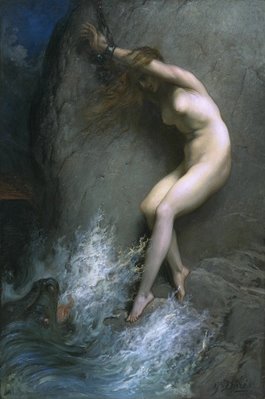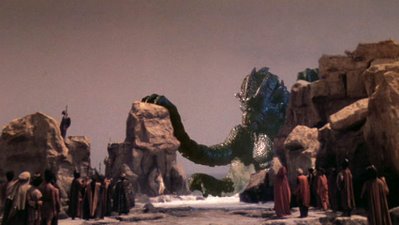Fulminata posted a review of the Robinson critique of Dawkins in the comments. I thought it would be worth pulling out parts of, because it is such an egregious example of the sort of thing which Robinson critiques in her article (too subtly for the reviewer, Lawrence Crowell, unfortunately).
Actually this review is not that great. She uses that old canard that Hitler used science for his race genocide and so forth, which is pure nonsense. Of course Hitler’s ideas had as much to do with biological evolution as perpetual motion designs have to do with physics.
Which merely demonstrates that the reviewer hasn’t bothered to read the article with even a modest amount of attention. Robinson writes: “Dawkins deals with all this in one sentence. Hitler did his evil “in the name of. . . an insane and unscientific eugenics theory.” But eugenics is science as surely as totemism is religion. That either is in error is beside the point. Science quite appropriately acknowledges that error should be assumed, and at best it proceeds by a continuous process of criticism meant to isolate and identify error. So bad science is still science in more or less the same sense that bad religion is still religion…To Dawkins’s objection that Nazi science was not authentic science I would reply, first, that neither Nazis nor Germans had any monopoly on these theories, which were influential throughout the Western world, and second, that the research on human subjects carried out by those holding such assumptions was good enough science to appear in medical texts for fully half a century. This is not to single out science as exceptionally inclined to do harm, though its capacity for doing harm is by now unequaled. It is only to note that science, too, is implicated in this bleak human proclivity, and is one major instrument of it.” (For more on the widespread uptake of eugenics, especially in the US, go here.)
One of the most important points that Robinson makes is this one: “To set the declared hopes of one against the real-world record of the other is clearly not useful, no matter which of them is flattered by the comparison. What is religion? It is described by Dawkins as a virtually universal feature of human culture. But there is, commingled with it, indisputably and perhaps universally, doubt, hypocrisy, and charlatanism. Dawkins, for his part, considers religion wholly delusional, and he condemns the best of it for enabling all the worst of it. Yet if religion is to be blamed for the fraud done in its name, then what of science? Is it to be blamed for the Piltdown hoax, for the long-credited deceptions having to do with cloning in South Korea? If by “science” is meant authentic science, then “religion” must mean authentic religion, granting the difficulties in arriving at these definitions.”
In other words, a level playing field.
One of the goals of science is to reduce some set of complex processes or systems into some small set of rules. It is a bit like a data compression algorithm we use — it can compress large amounts of data into a few postulates. Whether one likes it or not Dawkin’s theory of the selfish gene largely does this. It might sound cold that all of life can be reduced to a set of self-replicating molecules which obey subMarkovian information principles — but this is about what biology is. Some people a couple of centuries ago did not like that Newton found the laws of motion reduced to a few principles, but that’s tough. Such people don’t like these things because it removes magic from the world.
What is often unacknowledged in an argument like this is that – probably due to either philosophical or historical ignorance – the governing metaphor or paradigm is a historically conditioned one. In other words, the mechanical model being assumed is one derived from Newton (derived in turn from some very bad theology), whereby a mechanical explanation is sufficient for the phenomena under consideration. Popular understandings of genetics seems now to be the only place where such a crude understanding is still embraced, as it has been rejected everywhere else.
And the point about magic is asinine; assertion masquerading as argument. Girard’s insight is truer: “The invention of science is not the reason that there are no longer witch-hunts, but the fact that there are no longer witch-hunts is the reason that science has been invented. The scientific spirit…is a by-product of the profound action of the Gospel text.”
Dawkin’s stance on religion is that it seeks to displace scientific principles, where in some cases they are well understood, with supernaturalistic stories. In other words such people would prefer that Noah’s flood be real, where by some magic 20 times the amount of water than what exists came and left the Earth in a great flood, than to have to grapple with the idea we Humans are just a tiny branch in the tree of life. Dawkins objects to the forcefulness with which such people want mythic stories of angels, demons, second comings, universal floods, along with all their magic which counters what is known or knowable by reasoned principles. As he sees it this amounts to the removal of realistic understandings and their supporting facts with fantasies and delusions supported purely by faith concerning their divine truth. Faith is the substance of things hoped for, the evidence of things not seen. Hebrews 11:1
Aaagh. Straw men again. This just assumes that ‘religion’ = late Modern Protestantism. It begs the question about what is being “displaced” and about what the “supernatural” is.
I am not so sure about his “war” against religion, when I think there are better ways to go about this. Yet I can understand the sentiment. Here my nation has a President who has set up a defacto Department of Faith (Faith based initiative) and other programs to extend the social power of churches in the nation. I do think it is time to push back against this rot, for if we don’t we will have a theocracy here. Supporters of religion and faith should not be so cowed by Dawkin’s charge, for they have their ducks lined up in the WhiteHouse and Congress — that is unless they really are terrified by the prospect that what they believe is a load of crap.
So tell me, in what way is this not the equivalent of the ‘Hitler was a scientist’ argument? Bush is a Christian, therefore all religion is awful.
Puhlease.
The real issue is that Dawkins and his ilk realise that they have lost the argument. They have quite clearly lost it politically (any analysis of the modern world that doesn’t take religion seriously is manifestly doomed to irrelevancy) but they have also lost the philosophical argument. Like all scientific revolutions, it will take time for this one to complete – but as the blowhards die off those coming to the field with fresh eyes will take up the better explanations. Atheism has had its day, and Dawkins – as Denys Turner so wonderfully puts it – is simply not up to scratch as a thinker in this sphere:
“…since today my purpose is to encourage the atheists to engage in some more cogent and comprehensive levels of denying, I shall limit my comment to saying that thus far they lag well behind even the theologically necessary levels of negation , which is why their atheisms are generally lacking in theological interest. So, I repeat: such atheists are, as it were, but theologians in an arrested condition of denial: in the sense in which atheists of this sort say God ‘does not exist’, the atheist has merely arrived at the theological starting point. Theologians of the classical traditions, an Augustine, a Thomas Aquinas or a Meister Eckhart, simply agree about the disposing of idolatries, and then proceed with the proper business of doing theology.”
(Denys Turner, ‘How to be an atheist’)





